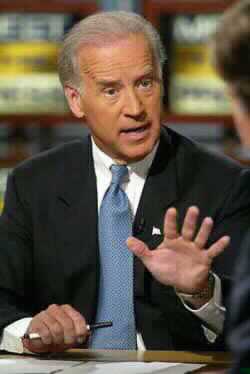HIGHLIGHTS: Senator Lieberman Wants Bush to Secure Congressional Authority First||U.S. Press Reports on Plans under Discussion to Attack Iraq||Iraqi Opposition Figure Says Baghdad to Use Bio-weapons Soon|| STORY: The chairman of the U.S. Senate Foreign Relations Committee on Sunday urged President Bush to build domestic and international support before a war against Iraq that he believes is likely.
Sen. Joseph Biden, a Delaware Democrat who presided over hearings on U.S.-Iraqi policy last week, did not rule out or flatly oppose an eventual war with Iraq, but he said Bush had to make his case.
"I believe there will probably be a war with Iraq," Biden said on NBC's "Meet the Press."
But he said of the administration, "I would talk less and plan more."
"It's important to build a case and a consensus that what we are doing is based upon a genuine threat," Biden said. "I think the case can be made but there's a lot more to do."
Biden, who has said he does not expect a U.S. attack this year, noted experts are divided about the exact nature of the threat posed by Iraqi President Saddam Hussein and his quest for weapons of mass destruction. But he said "absent some significant change in the environment," Washington may well have to act to neutralize them.
CONGRESSIONAL AUTHORITY
On "Fox News Sunday," Sen. Joseph Lieberman, a Connecticut Democrat, urged Bush to "take hold" of an obviously divided administration and said the U.S. Congress should give the president the authority to act as he deems necessary before it adjourns this year.
"Every day that Saddam remains in power, with chemical weapons, biological weapons and the development of nuclear weapons, is a day of danger for the United States of America," Lieberman said.
Senate Majority Leader Tom Daschle told ABC's "This Week" he had not decided on a timetable for Senate debate, and believes the United States needs to be cautious. But he added, "I don't think that anybody supports Saddam where he is today."
Gen. Brent Scowcroft, the first President Bush's national security adviser during the 1991 Gulf War who advises the current president on foreign affairs, cautioned on CBS's "Face the Nation" that a war now could lead to an "explosion in the Middle East" that could undermine the U.S. war on terrorism.
U.S. newspapers have reported several plans were under discussion within the administration, ranging from a massive onslaught from three neighboring countries to more concentrated operations to cut off Saddam and neutralize his weapons of mass destruction.
IRAQI OPPOSITION FIGURE SAYS BAGHDAD TO USE BIO-WEAPONS SOON
Opposition Iraqi National Congress leader Ahmad Chalabi meanwhile charged that Iraqi President Saddam Hussein soon would use weapons of mass destruction.
"Saddam has advanced chemical weapons, he has advanced biological weapons, and he has produced and engineered biological weapons which contain a combination of viruses such as smallpox and ebola. Those are very, very dangerous weapons and I think, in his hands, he is bound to use them in terrorist action very soon," Chalabi told Fox television on Sunday.
The Iraqi president, according to Chalabi, is "working very hard ... to position people and to move with biological and chemical terrorism across the important centers of the world.
Pressed on the source of his information, Chalabi said "we have people who have worked in the (alleged Iraqi) program who have come out recently and have contacted us, and now they are in the United States and they are talking to the US government and they have demonstrated with unquestioned authority that Saddam does have boilogical weapons.
PHOTO CAPTION
U.S. Senator Joseph Biden (D-De) speaks during a taping of NBC's 'Meet the Press' television news program, August 4, 2002 in Washington. Biden spoke about the Senate hearings on Iraq and the possibility of a military attack on the middle eastern nation. (Alex Wong/Meet the Press via Reuters)
- Author:
& News Agencies - Section:
WORLD HEADLINES


 Home
Home Discover Islam
Discover Islam Quran Recitations
Quran Recitations Lectures
Lectures
 Fatwa
Fatwa Articles
Articles Fiqh
Fiqh E-Books
E-Books Boys & Girls
Boys & Girls  Articles
Articles










